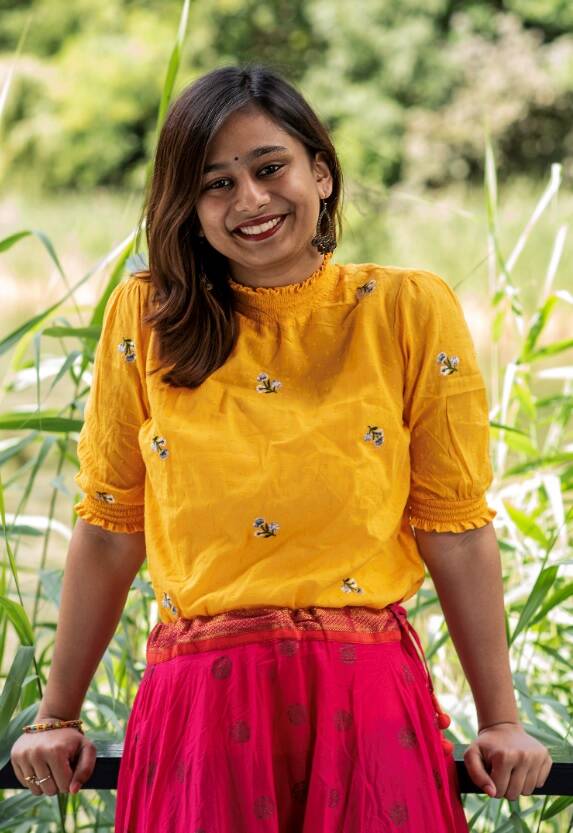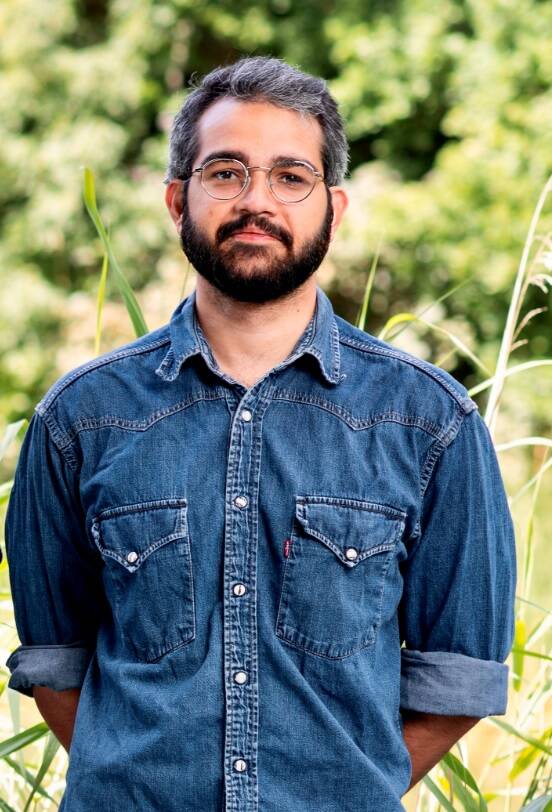RESEARCHER PROFILES

Dr. Marike van Aerde
Marike van Aerde is our project leader. She is Assistant Professor World Archaeology and coordinator of the Honours Academy archaeology track at Leiden University. Her research focuses on the archaeology of ancient trade routes between East Africa and the Indian Subcontinent (ca. 300 BCE-800 CE). Her project Routes of Exchange, Roots of Connectivity examines multiregional sites and datasets across the Indian Ocean region by means of interdisciplinary and scientific methods, such as ceramics studies, chemical analysis (XRF), satellite, LiDAR, and database analyses. These analyses provide a basis for a wider synthesis on questions of global connectivity in the ancient world. Recent publications include studies on Indian Ocean trade networks, ancient Egyptian, Aksumite and Indian port sites, and the documentation and preservation of rock art from the Karakorum Himalaya mountains.
Marike appears regularly at international conferences, and actively pursues Open Access and international Heritage initiatives. She frequently collaborates with the Antiquities Museum in Leiden (RMO) for public outreach programs, and maintains international collaborations with universities and institutes in India, Sri Lanka, Pakistan and Egypt. She actively encourages interdisciplinary approaches to archaeological research and discourse, including current issues such as politics and global affairs, heritage threats, sustainability and climate change.
From 2019-21, Marike held simultaneous Lectureships at the Faculty of Archaeology and the Ancient History Department in Leiden. In 2021 she set up Heritage fieldwork in the Karakorum mountains of Pakistan together with Prince Claus Heritage Grant awardee Abdul Ghani Khan. In 2019-20 Marike was awarded the LeidenGlobal seed grant for her research project, and from 2016-19 she held the Postdoctoral Byvanck Fellowship at Leiden University. Her doctoral research (2015) examined connectivity and exchange between Egypt and Rome. Fieldwork included campaigns at the Palatine Hill in Rome and material analyses in collaboration with the Soprintendenza Archeologica di Roma, the Royal Dutch Institute in Rome (KNIR), and The British Museum in London. Marike also holds a (cum laude) Master’s degree from Radboud University (2005), and was awarded the Graduate School Research Scholarship from University College London (UCL, 2005-2008).
To visit Marike's profile page at Leiden University, click here

Samatar Ahmed Botan
Samatar Botan is preparing for his PhD research at Leiden University, and continues to be part of the research project Routes of Exchange, Roots of Connectivity. He previously completed his Bachelor's and Master's degrees at the Faculty of Archaeology in Leiden, as well as a secondary Research Master's at the Sultan Qaboos University in Muscat, Oman.
He is the ceramics specialist of the team, with multiple years of fieldwork experience. For his doctoral research, Sam will aim to create a more detailed and nuanced understanding of the Afro-Eurasian maritime trade routes in the first half of the first millennium CE, by focusing on a statistical and interpretative analyses of Aksumite ceramics. The empire of Aksum was an ancient kingdom which existed in the Horn of Africa from 80 BCE till 800 CE. Its territory stretched from modern day Ethiopia, to Eritrea to the northern parts of Somaliland.
The role of Aksum has in the past been neglected in studies of ancient trade networks, which Sam's research hopes to remedy. Simultaneously, Sam continues to be involved in projects in the Persian Gulf as a ceramics specialist, such as the Hili 14 project and the Understanding Prehistoric Settlement Dynamics at Shimal project. His extensive experience with archaeological fieldwork has so far included campaigns in Syria, Portugal, Kurdistan, Oman and the United Arab Emirates, and he has co-authored several academic publications and excavation reports from sites in Oman.
To visit the Vlog about Sam's PhD research at Leiden University, click here

Rishika Dhumal
Rishika Dhumal has been enrolled as PhD candidate at Leiden University since 2019, as part of the research project Routes of Exchange, Roots of Connectivity supervised by Dr. Marike van Aerde. Previously, she completed her Bachelor's degree in Archaeology from the Maharaja Sayajirao University of Baroda in India, as well as her Master's degree from the Archaeology Faculty of Leiden University in the Netherlands. Her fieldwork experience includes recent excavations at Nani Rayan in Gujarat, India, as well as an internship in Silk Roads ceramics analysis as part of the LID project (Leiden Inventory Depot) at Leiden University. She has also attended various international conferences, at Alexandria, Egypt and Oxford University in the UK.
Rishika's PhD research will archaeologically analyze the role of the Indian subcontinent in the Afro-Eurasian trade networks.
This will be studied along with the connection between trade and Buddhism across the Indian subcontinent, by using a trans-regional approach to determine the subcontinent’s role and analyzing multiple sites from three selected regions, Gujarat, Maharashtra and Sri Lanka. The connection between trade and Buddhism is made quite a lot with the Silk Routes trade because of many prominent Buddhist sites along the trade route (Bamiyan Buddhas, Taxila, Mes Aynak, etc). Still, this presence of Buddhism is not given enough emphasis throughout the subcontinent in the context of trade. Rishika's PhD research will highlight these aspects and investigate further to get a better understanding of this connection.
To visit Rishika's profile page at Leiden University, click here

Abdul Ghani Khan
Abdul Ghani Khan completed his Master's degree in archaeology with a Gold Medal from Hazara University in Pakistan in 2014. He moreover completed his MPhil degree in 2018 at the same institution. He has extensive experience in the field, through many national and international archaeological excavations and survey projects. He holds an expertise in 3D modelling and Photogrammetry techniques as well. Ghani's main research interest is in documenting and studying rock carvings of the Karakorum Mountains, in particular Buddhist carvings. Recently, he also co-authored a new publication on Karakorum petroglyphs from Oxford University together with Dr. Marike Van Aerde and Alexander Mohns.
In 2020, Ghani was awarded the Prince Claus Heritage Emergency Grant. He will be the fieldwork and outreach coordinator of this project, focused on the rescue and preservation of ancient rock art in the Karakorum mountain range of the Pakistani Himalayas. The project will run until November 2021.
An important component will be the outreach and education program developed with the local communities that Ghani is developing for this purpose. Additionally, he will focus on the documentation and analysis of so far unrecorded rock art and, based on the efforts of this fieldwork, continue his research as part of an academic PhD trajectory.
To read more about Ghani's Prince Claus Heritage Grant, click here

Alexander Mohns
Alexander Mohns is the team’s fieldwork coordinator. He can usually be found in the field on excavations. Alex has a keen interest in Applied Archaeology and excavations.
His international experience so far includes fieldwork conducted in the Dominican Republic, Jordan, Pakistan and the Netherlands. Some of Alex’s academic accomplishments involve a comprehensive analysis of figurative Buddhist rock art from the Karakorum mountain range in Pakistan for his BA thesis. He has since then also co-authored a book chapter on these petroglyphs at Oxford University together with Dr. Marike van Aerde and Abdul Ghani Khan.
Alex is currently completing his Master's degree in Applied Archaeology at Leiden University, and he continues to collaborate with Ghani Khan and Dr. Van Aerde as part of the team's Karakorum Heritage Rescue project that will run from 2020-2021.
It is the sense of adventure and accomplishment that keeps bringing him back to the field: all he needs is for someone to tell him where to go (even with only a moments notice), he’ll be off travelling again. Apart from his fieldwork and academic studies, Alex is the team's Vlog coordinator and PR organizer. He is also responsible for (most of the) puns.
To visit the Alex's Vlog about the ceramics depot of Leiden University, click here

Daniele Zampierin
Daniele Zampierin has recently finished his MA within the European Erasmus Mundus join Master program “ARCHMAT” (ARCHeological MATerial Science). Thanks to this program, he followed courses related to the conservation and the archaeometric approach to archaeological material at the University of Evora, at the “Sapeinza” University of Rome and at the “Aristotle” University of Thessaloniki. Prior to his MA, he completed his BA in Archaeology at the University of Leiden. His international experience not only includes academic environments, but also fieldworks conducted in the Dominican Republic and Netherlands and various conferences such as at the Oxford University (UK), Pisa University (IT) and Lisbon. Within Daniele’s academic accomplishments there is also the publication of an article within the Journal of Ancient West and East in collaboration with Dr. Marike van Aerde in 2020.
Daniele is currently collaborating, not only with the Routes of Exchange: Roots of Connectivity project, but also with the DIOHMAP project and in the editorial board of the Archeologia Veneta journal.
It is the thrill of combining archaeological research questions and scientific techniques analysis that has driven Daniele towards a more scientific approach to the study of archaeological materials. In fact, his believe is that archaeological materials can hide information about their past starting from a macroscopical point of view, all the way to microscopic inclusion and atomic level making the development of new scientific techniques the key for the development of a new approach to archaeology. However, the desire for discovery and the importance of visualizing the archaeological context keeps bringing him back to the field and pushes him to travel at any occasion.
To watch Daniele's contribution to our team documentary, click here